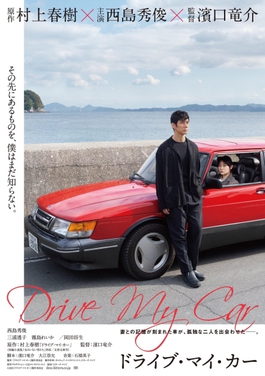← Back to Reviews
in
Drive My Car
Nominated for four Oscars including Best Picture, the 2021 Japanese film Drive My Car features a really lovely film that runs about an hour and 45 minutes trapped inside a three hour movie struggling to break free of its constraints.

This film is about an actor and director named Yűsuke Kafuku who is married to a screenwriter named Oto, whose marriage began to fall apart after the tragic death of their daughter. Oto's career begins an upswing when she finds an unconventional method of channeling her grief into her work and her marriage. Not long after Kafuku has concluded appearing in a production of Waiting For Godot, he simultaneously is offered a job directing a production of Uncle Vanya in neighboring Hiroshima and must deal with his wife's passing. Upon arrival in Hiroshima, Kafuku has auditions for the play and one of the actors he auditions, Takasha, he once caught having sex with his late wife, but he gives him the lead in the show anyway.

There is actually a very emotionally-charged story in the middle of this Oscar-nominated screenplay, but it is hiding behind a lot of beautiful photography, unnecessary characters, and a lot of minor plot detours that bloat this very lovely story to the gargantuan length of close to three hours and, sadly, we feel all three of them starting with Oto telling Kafuku a story in the middle of sex, which initially has us wondering what story is important enough to accompany sex, but we have to wait an awful long time to find out exactly what's going on. Before long we learn that Kafuku has an accident that make it medically dangerous for the guy to drive then he arrives in Hiroshima and learn that he won't be able to drive to rehearsals and that a driver has been hired for him. And believe it or not, this all happens before the opening credits roll.

We don't realize it until it's actually happening, but the opening credits don't begin to roll until almost 40 minutes into the running time, implying that most of what we have seen up to this point is probably backstory. The story that eventually comes to fruition at the center of this film is quite beautiful, but the viewer has to wade through almost two hours of of gorgeous and pointless photography, endless shots of the lead character and his driver driving through tunnels and mountain sides, and scenes of brainless Asian actors trying to figure out what Kafuku is trying to do to Uncle Vanya to get to the real story here.

The direction is sensitive, but overly detailed and there are a pair of solid performances from Hidetoshi Nishijima as Kafuku and Toshiaki Inomata as Takahasi, but eventually a terrific story drowns in its own pretension, or the storytellers.
Nominated for four Oscars including Best Picture, the 2021 Japanese film Drive My Car features a really lovely film that runs about an hour and 45 minutes trapped inside a three hour movie struggling to break free of its constraints.

This film is about an actor and director named Yűsuke Kafuku who is married to a screenwriter named Oto, whose marriage began to fall apart after the tragic death of their daughter. Oto's career begins an upswing when she finds an unconventional method of channeling her grief into her work and her marriage. Not long after Kafuku has concluded appearing in a production of Waiting For Godot, he simultaneously is offered a job directing a production of Uncle Vanya in neighboring Hiroshima and must deal with his wife's passing. Upon arrival in Hiroshima, Kafuku has auditions for the play and one of the actors he auditions, Takasha, he once caught having sex with his late wife, but he gives him the lead in the show anyway.

There is actually a very emotionally-charged story in the middle of this Oscar-nominated screenplay, but it is hiding behind a lot of beautiful photography, unnecessary characters, and a lot of minor plot detours that bloat this very lovely story to the gargantuan length of close to three hours and, sadly, we feel all three of them starting with Oto telling Kafuku a story in the middle of sex, which initially has us wondering what story is important enough to accompany sex, but we have to wait an awful long time to find out exactly what's going on. Before long we learn that Kafuku has an accident that make it medically dangerous for the guy to drive then he arrives in Hiroshima and learn that he won't be able to drive to rehearsals and that a driver has been hired for him. And believe it or not, this all happens before the opening credits roll.
We don't realize it until it's actually happening, but the opening credits don't begin to roll until almost 40 minutes into the running time, implying that most of what we have seen up to this point is probably backstory. The story that eventually comes to fruition at the center of this film is quite beautiful, but the viewer has to wade through almost two hours of of gorgeous and pointless photography, endless shots of the lead character and his driver driving through tunnels and mountain sides, and scenes of brainless Asian actors trying to figure out what Kafuku is trying to do to Uncle Vanya to get to the real story here.
The direction is sensitive, but overly detailed and there are a pair of solid performances from Hidetoshi Nishijima as Kafuku and Toshiaki Inomata as Takahasi, but eventually a terrific story drowns in its own pretension, or the storytellers.
